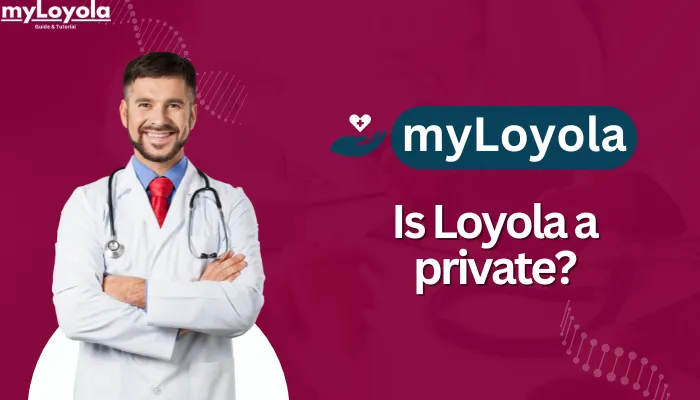Did you know there is a difference between public and private universities? do you want to Is Loyola a private? You’re not alone on this! When deciding how best to be educated, many times it requires one to understand the intricacies of university structures.
This article takes a deep dive into the different types of universities, with a particular focus on Loyola University.
We will also uncover if Loyola is a private or public institution and analyze the implications of this categorization.

Understanding the University Landscape
Let’s differentiate between Public and Private universities first and we will talk about whether Is Loyola a private? or public? In general, universities can be divided into two categories: private and public.
- State governments finance most of their activities thereby making them cheap for residents. In addition, they have larger student populations and emphasize research activities.
- Private Universities, on the other hand, get much of their money from tuition fees, alumni donations as well as investment income generated by endowments.
This financial freedom allows them to design curriculums more flexibly while offering personalized learning experiences. They are generally smaller schools with a more intimate campus atmosphere.
Is Loyola a Private? or Public
This time let us consider Loyola University in New Orleans/Chicago. With campuses in vibrant cities like Chicago and New Orleans, Loyola University has built itself up as an outstanding academic institution.
But still, the question remains unanswered; does it fall under the category of being public or private?
Loyola University has stood firm as a private establishment over the years without breaking down its foundation. Founded in 1870 by members of the Society of Jesus (Jesuits), which gives it a unique learning environment that emphasizes social justice and service to others.
Loyola’s operations heavily rely on its private status which significantly impacts its functioning here are a few examples;
Governance: These schools are free to set up their own policies and curricular requirements. As a result, this institution of higher learning is capable of customizing its academic programs to suit the unique needs of its students as well as keeping pace with the changing educational trends.
Funding: In addition, Loyola University Chicago operates on a private sector basis where tuition fees from students and donations by alumni are used to finance most operations performed within the campuses.
Loyola’s financial independence enables it to provide smaller class sizes, highly qualified lecturers plus top-notch facilities for its students.Historical Context and Founding Mission
Loyola is often connected with its historical background and founding mission because of its private nature. Is Loyola a private? Yes, and that can be traced back to its very beginning.
Unlike public universities, which are mainly funded by the government, Loyola has the freedom to shape its destiny guided by its core values and educational philosophy.
For instance, in case it’s a faith-based institution started by a religious order, Loyola’s mission may emphasize educating students within a specific faith tradition.
This autonomy enables the university to match up with student bodies that share similar values with itself and develop an identity different from other institutions.
Academic Offerings at Loyola
The biggest advantage that comes from being a private institution like Loyola is the quality education one gets here as opposed to elsewhere4. Here’s what makes it special:
Specialized Programs: Other than mainstream courses offered in public universities; private tertiary institutions have many specialized programs targeting niche interests or emerging fields.
This gives students a chance to follow different academic paths and position themselves better in the employment industry.
Unique Features: Smaller classes may be available at Loyola rather than at public universities with larger student bodies.
This fosters a more personalized learning environment where professors can provide more individualized attention to each student. In addition, private institutions may have sufficient resources for state-of-the-art technology as well as facilities to enhance general learning.Financial Independence
Government funding for public colleges is unstable depending on economic and political changes Is Loyola a private? Being privately owned means that Loyola has more control over where its finances go. This has led to many benefits that have positively impacted students:
- Tuition and Fees: Private universities such as Loyola typically charge higher tuition fees compared to their public counterparts.
However, these fees directly contribute towards the running of the university hence making possible greater investment in academic programs, facilities, and student support services.
- Impact of Private Funding: Fundraising campaigns coupled with donations received from alumni are instrumental to most projects initiated by Loyola.
By concentrating on cutting-edge research projects or awarding scholarships for deserving learners, this kind of dedicated funding could result in creative curricula that would otherwise not be done using government budgets alone.
Student Experience at Loyola
Is Loyola a private? Yes, and there are more than academics. Here’s what life might be like for students at Loyola:
| Characteristic | Explanation |
|---|---|
| Size of Classes | Their small number make them conducive to interactive teaching and learning, giving students a chance to benefit from close contact with their instructors. |
| Campus Culture | Their small number makes them conducive to interactive teaching and learning, giving students a chance to benefit from close contact with their instructors. |
| Community Involvement | There is a focus on social responsibility through volunteer opportunities, service learning projects, and contributions to society at large. |
Conclusion
In conclusion, Is Loyola a private? is a very important question as knowing whether a university is public or private enables you to make educated choices about your education.
State universities can be cheaper for residents, while private schools may offer students more individualized education and perhaps even specialized degree programs.
Loyola University New Orleans/Chicago is a private establishment that combines an intellectually rigorous curriculum with deep Catholic roots and an emphasis on justice.
If you’re looking for an exciting and intellectually stimulating atmosphere for study, then consider enrolling at Loyola University.
Deciding on a college is an important choice. However, knowing the particular benefits that come with a private university like Loyola will give you the power to make informed decisions.
